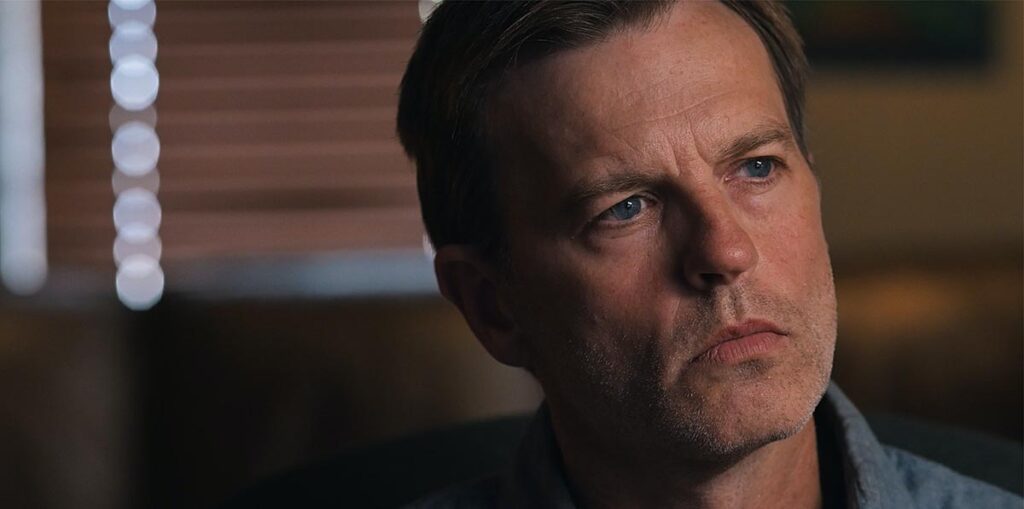
St. John as Tyler Hamilton in A Good Enough Day.
In Trevor St. John’s (Tucker, Y&R) feature film directorial debut, A Good Enough Day — which he co-wrote, as well — he stars as Tyler Hamilton, a terminally ill photographer seeking to repair his fractured relationships in his life. Shot in 2021, the movie is now available for streaming on platforms including Amazon TVOD and AppleTV. Soap Opera Digest chatted with St. John about the poignant project.
Soap Opera Digest: What is the origin story of this project?
Trevor St. John: The producer, Don Hamilton, who also happens to be my stepfather, said, “You know, we have some capital with which to shoot something. And if you and your co-writers” — who are my cousins/brothers Brett Clothier-Sharman and Graham Sharman — “can come up with something within that budget, we’ll shoot it.” My stepfather is a professional still photographer, cinematographer and filmmaker working mostly in commercials, and this [a feature film] is something he always wanted to do, and so Graham and Brett and I set about figuring out how to shape something and come up with a story within the parameters of the budget. Budget is highly dictated by how many company moves [changes of locations, in filmmaking parlance] there are on a film, how many days of shooting, the cast, wardrobe, all that stuff. That limitation spawned a lot of creativity in us. We shot it on Don’s soundstage in his studio; we we thought, “Well, what if we wanted to shoot it there?” It’s a great space with great little spaces within this large studio, and so we thought, “Let’s make it about a photographer. “ The story evolved from there, but that was the origin — “Let’s shoot a film, and can we do it within these limitations?”
Digest: What was the process for developing the narrative around this central character of the photographer, Tyler, who you play in the movie?
St. John: We spitballed [ideas] for a long time on the phone — “What if it’s this? What if it’s that?” And we hung up and Graham, one of my co-writers, took a shower and he came up with the idea. So many great things happen when you’re relaxing, right? We had talked about wanting to shoot it in a single day, so you don’t have a lot of wardrobe changes. And Graham thought, “What if it’s his [the main character’s] last day? That would really concentrate the drama! If it’s his last day, what would we have to do? [What] if it was his last day and he had to, in the course of this single day, mend his entire life, essentially, and his relationships?” All movies are about relationships, really. We made those relationships strained and so he had to repair them, repair the damage. He’s a man overcome by grief from the loss of his son 10 years ago. That grief has really shackled him, overcome him and led to estrangement with the people that matter to him most. And in the course of this single day, as the title suggests, he’s got to salvage those relationships. Graham came up with the germ of the idea and then we just kind of ran with it in [fleshing out] the story.
Digest: I think the beauty of this movie is that in watching it, I didn’t feel like I was being spoon-fed this guy’s journey, and that you managed to unfold a very clear evolution in his outlook over the course of the film, but in a subtle way.
St. John: I really appreciate that you pointed that out because I was thinking today, “Why we made it the way we did is because we said to ourselves, ‘Let’s make a movie that we wish filmmakers made more of today.’ ” I think the state of filmmaking today is that there’s a prevalence of a lack of respect for the audience, for the emotional intelligence of the audience. As you say, the audience is normally nowadays spoon-fed what’s going on. “Oh, we can’t possibly have the audience not know exactly what’s happening at each moment!” And so we said, “Let’s just peel back the onion a little bit at a time, keep them interested but not give them everything. And let’s really respect the audience.” We made a movie that we wanted to see, really. We said, “Let’s make a movie that says, ‘Hey, I, think all you people [watching] understand human behavior and you have great intuition.’ ”
Digest: Your character, Tyler, reaches out to key people in his life over the course of the movie in phone calls. Were those calls actually shot live?
St. John: Yes, they were. And what’s interesting about the final phone call, with Tyler’s daughter [from whom he’s estranged], I did not have any idea what was going on with her. My co-writers, Brett and Graham, worked with the actress about what was happening in her story, what was happening in her [character’s] life, and withheld it from me. So I’m directing the film, playing this role of her father, and I have no idea [what she’s going to reveal in this call]. So when you see that phone call with her, it’s the first time I’ve heard it. We had to really rehearse the technical move [that scene required] because it’s [all] one shot, going upstairs into a room, landing, and then playing it out and we wanted to capture my reaction of hearing all this information for the first time in, of course, the first take. Luckily, we nailed it technically the first time, so what you’re seeing [in the final product] is me hearing this information from her about what’s going on in her life in real time, the first time.
Digest: As the director of this movie as well as its star, how would you rate yourself as an actor to direct?
St. John: Oh, as an actor [laughs]? I thought I was a real pain the ass! I almost walked off the set! It’s funny — when you’re doing both, I guess somehow, over this 30-year career of working with so many great directors, I just gleaned so much. The directing was surprisingly easy. Maybe it was born of ignorance or arrogance or something like that, but I didn’t sweat it too much, I didn’t say, “Oh, my God, this is first film, what do I do?!” I trusted myself completely, for better or for worse. And then I do the same thing when the cameras are rolling and I’m in front of the camera. I couldn’t really rate how I intertwined the two. I was lucky to have Brett, one of co-writers, on set with me, who, when I was performing, I could look to and say, “Are we getting the story here?” Because I’m not directing myself as I’m acting; I can only do one thing at a time. And he would say, “Yeah, we got it there.” And of course, I relied heavily on Don Hamilton, the cinematographer. So I felt very supported that way. It was actually a less stressful experience than I expected it to be. I always hear about directors who are acting in their own gigs and I was like, “Man, that sounds like you’d want to pull your hair out!” But it really was playful. I was really lucky that way.
Digest: Are there any scenes that stand out to you that, in advance of doing them, made you a little nervous about whether you were going to nail them?
St. John: Yeah, the final scene, in what we call the “death zone”, because it’s on this Cyclorama wall in the studio, [which has] no depth, a white background. We knew it was going to be a long scene. It’s the climax scene, and [we had] no rehearsal whatsoever, and it was going to be done in one take. We had two cameras going simultaneous so we could get both coverages at once and we could get real reactions to what was going on. I was curious about how that was going to go and I had no idea that the emotional expressions that I went to were going to happen. I had no idea that that was going to occur. I was curious and a little anxious about it because the end of the film is always the most important part. You have to nail the end!
Digest: What do you want people to know about the film before they see it?
St. John: A couple of things. First, there are universal themes in here. Everyone who is going to watch this movie has experienced deep sadness and deep heartbreak, grief. Everyone has experienced relationships that have been estranged to a certain extent. Everyone’s dealing with their own mortality — whether they refuse to think about it, whether they’re young and they think, “Oh, it’s, it’s not gonna happen,” or they’re getting older and they think, “Man, it’s right around the corner,” or they’re ill or they know somebody that is. There is nothing [in this film] that is so specific that you can’t find an element of it that you won’t relate to. And then as you pointed out earlier, it’s a film that, I hope, people feel really respects their intelligence, really respects their intuition [about] human behavior, their emotional intelligence. The thing that we hear most is not just the reaction — the physical reaction, people leaving in tears — but that it stays with them for days because it raises all sorts of questions. I hope it’s a film that makes you think and feel respected. And I would also like to give a shout-out to the other performers in the cast — Josh Wingate [ex-Carter, GH], who plays the doctor, and the actress who played my sister, Lisa Fuller, and my ex-wife, Sherri [Saum, ex-Keri, ONE LIFE TO LIVE; ex-Vanessa, SUNSET BEACH]. Just fabulous, talented people who were really willing to lay it all out there. And Don, who shot it. We shot it with a skeleton crew and a really tight schedule and I was just really proud to be a part of the film.
Watch the official trailer for A Good Enough Day below.







